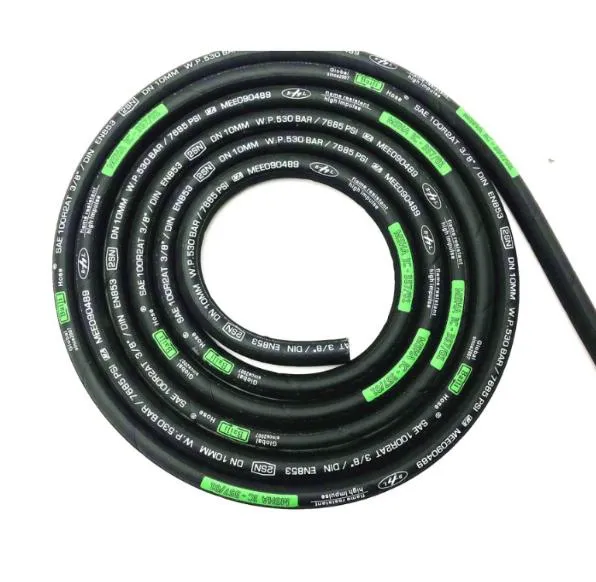Jul . 02, 2025 11:38 Back to list
Powering Performance in Demanding Environments
Hydraulic systems are the heartbeat of countless industrial machines, driving essential operations in sectors ranging from agriculture and mining to construction and manufacturing. At the core of these systems lie hydraulic hoses—highly engineered components that deliver pressurized fluid to power complex mechanical movements. Among the wide range of hoses available, three distinct types stand out for their performance, versatility, and durability: the wire braid hydraulic hose, the smooth cover hydraulic hose, and the wrapped cover hydraulic hose. Understanding the differences among these types is key to selecting the right solution for your operational needs.

What Makes wire braid hydraulic hose Reliable in High-Pressure Systems
The wire braid hydraulic hose is specifically designed for applications that demand high pressure and reliable performance under extreme working conditions. This hose features one or more layers of braided high-tensile steel wire reinforcement, which allows it to withstand significant internal pressure without expansion or rupture. The wire braid structure also contributes to improved flexibility and better impulse resistance compared to spiral-wire counterparts, making it ideal for mobile machinery that requires tight bend radii and dynamic movement.
Industries such as construction, mining, and heavy equipment manufacturing rely heavily on wire braid hydraulic hose products for critical applications like boom arms, hydraulic lifts, and steering mechanisms. The hose's ability to maintain structural integrity while handling pulsating pressures ensures safe and efficient fluid transfer. Additionally, many of these hoses meet stringent international standards for abrasion resistance, thermal stability, and chemical compatibility, ensuring long-term reliability in harsh environments.
Why smooth cover hydraulic hose Is Ideal for Compact, Clean Environments
The smooth cover hydraulic hose is engineered for use in clean, confined, or indoor environments where aesthetic appearance and ease of handling are important. Unlike traditional wrapped surfaces, the smooth outer cover minimizes friction against machine surfaces and adjacent hoses, reducing wear and the potential for damage over time. The low-friction exterior also makes the hose easier to route through tight spaces and simplifies cleaning, which is especially valuable in manufacturing facilities and automated production lines.
A key advantage of the smooth cover hydraulic hose is its compatibility with standard crimping systems, allowing for quick and consistent assembly. These hoses are often used in injection molding machinery, robotics, and other equipment where space efficiency and visual cleanliness are priorities. The outer cover is typically made from synthetic rubber or thermoplastic materials with added resistance to oil, ozone, and light abrasion, making it a durable option for light- to medium-duty hydraulic applications.
How wrapped cover hydraulic hose Withstands Harsh Outdoor Conditions
Designed to thrive in rugged, outdoor, and abrasive environments, the wrapped cover hydraulic hose is built with a textured rubber exterior that enhances abrasion resistance and grip. This type of hose is ideal for industries like agriculture, forestry, and mining, where equipment often operates in muddy, rocky, or UV-exposed conditions. The rough surface of the wrapped cover provides added protection against external wear, extending the hose's operational life in challenging scenarios.
The wrapped cover hydraulic hose is particularly beneficial in mobile hydraulic systems such as plows, excavators, backhoes, and tractors. Its robust outer layer shields the inner reinforcement from damage caused by external contact or dragging across rough surfaces. Many wrapped cover hoses are also resistant to chemicals and temperature extremes, making them suitable for fluid transfer systems in the oil and gas industry. Their design emphasizes durability over flexibility, favoring reliability in stationary or low-mobility applications.
Choosing the Right Hydraulic Hose for Your Industry
Selecting the appropriate hydraulic hose depends on a variety of factors, including pressure rating, environmental exposure, installation space, and desired longevity. The wire braid hydraulic hose is the go-to choice for high-pressure systems that require reliable performance and flexibility, such as those found in construction equipment and mobile machinery. If your operations are primarily indoors or in clean conditions, the smooth cover hydraulic hose offers aesthetic and functional benefits, particularly where hose routing and cleanliness are critical.
On the other hand, operations in tough, outdoor environments with frequent exposure to abrasion and harsh weather will benefit from the rugged build of the wrapped cover hydraulic hose. This hose type ensures long-term reliability where other hoses might wear out prematurely. Knowing the conditions your hose will face—and the physical layout of your system—will guide you to the most cost-effective and operationally sound choice.
Wire braid hydraulic hoseFAQs
What makes a wire braid hydraulic hose suitable for high-pressure applications?
The wire braid hydraulic hose is reinforced with high-tensile steel wire that offers excellent pressure resistance and flexibility, making it ideal for applications involving high-pressure fluid transfer.
Can I use a smooth cover hydraulic hose in automated factory systems?
Yes, the smooth cover hydraulic hose is well-suited for factory automation due to its low-friction outer surface, easy routing, and clean appearance, which are essential in confined and controlled environments.
When should I choose a wrapped cover hydraulic hose for my equipment?
A wrapped cover hydraulic hose is recommended for outdoor and rugged environments where high abrasion, UV exposure, and harsh handling are common.
How does a wire braid hydraulic hose compare to a spiral hose in terms of flexibility?
While both can handle high pressure, the wire braid hydraulic hose is generally more flexible and better suited for dynamic applications with tight bend radii.
What are the cleaning and maintenance benefits of a smooth cover hydraulic hose?
The smooth cover hydraulic hose is easy to clean and less prone to external wear, making it an excellent choice for sanitary or aesthetic-sensitive installations.
-
Thermoplastic Hose Chemical Resistance Fluid Compatibility
NewsJul.14,2025
-
Steel Wire Braid Hydraulic Hose Factory Production Process
NewsJul.14,2025
-
SAE Hydraulic Hose Specs Textile Reinforcement Layer Structure
NewsJul.14,2025
-
High Pressure Hydraulic Hose Factory CNC Bending Process
NewsJul.14,2025
-
China Wire Spiral Hydraulic Hose High Temperature Resistance
NewsJul.14,2025
-
Automotive Air Conditioning Hose Ozone Resistance Testing
NewsJul.14,2025
